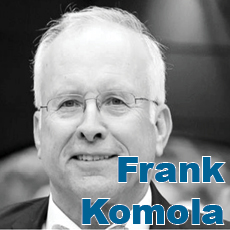
Frank Komola retired in 2012 following a 23 year career at UPS. He belongs to the retirees chapter of Local 25, International Brotherhood of Teamsters in Boston. He and his wife, Lisa, live in Haverhill.
Hosting the Open Mike Show here on 97.9 FM WHAV combined with my recent attendance at the National Alliance on Mental Illness [NAMI] convention on June 30th in Washington, D.C. has reinforced my belief in compassionate care.
One of my first guests on the show was Andover’s addiction outreach team. They have been tasked with, and have willingly accepted the challenge of, reaching out to victims of addiction, not only the addict themselves, but the families of those addicts. Their goal is to reach out to help these individuals find a set of options that they can utilize to improve their chances for recovery, and to help the addict’s family members, who usually are as severely impacted by addiction as the addict themselves. Keeping the addict out of the criminal courts and jails is one of the goals the town has set for themselves.
The National Alliance on Mental Illness, also known as NAMI, has developed a mandate to help the large percentage of individuals with mental illness who end up in the criminal justice system. And the number of people with mental health issues that end up in jails is staggering.
And once again, the goal is to have mechanisms in place, not only within the criminal justice system, but within the social service provider community, to identify those persons who suffer from mental illness, and who should not be placed in the criminal justice system in a way that separates them from the mental health services they need.
Both of these examples recognize that in the majority of cases, a jail cell is not the answer that will help them stop their actions, or prevent them from re-entering the criminal justice system again in their futures.
And just last week two leaders from Emmaus of Haverhill were guests on my program. They talked about their efforts to provide much needed services to homeless individuals, as a means of returning them to a semblance of a normal life and a return of their dignity.
So I hope that those of you who read this column, or have listened to my show, will learn to accept the fact that very few people who suffer any of these debilitating circumstances CHOOSE to go down those roads, that they need to be dealt with in a compassionate way, and that we need to support them during their struggle. This community of ours needs to support the people who dedicate their lives to helping these less fortunate victims too. We must continue to advocate for, or provide the funds to address, the major crises these problems have brought into our communities. It will truly be money, time and dedication well spent!


Good for you Mr Komola
Well said, Frank.